
Concert Programs
USC Thornton Winds concert program
Conductors Frank Ticheli and Carl St.Clair lead the USC Thornton Winds in an evening concert.
The program features Ticheli’s Fantastic Dreams and Over the Moon, John Stevens’ Grand Concerto for Four Tubas, Omar Thomas’ Of Our New Day Begun, and Morten Lauridsen’s O Magnum Mysterium
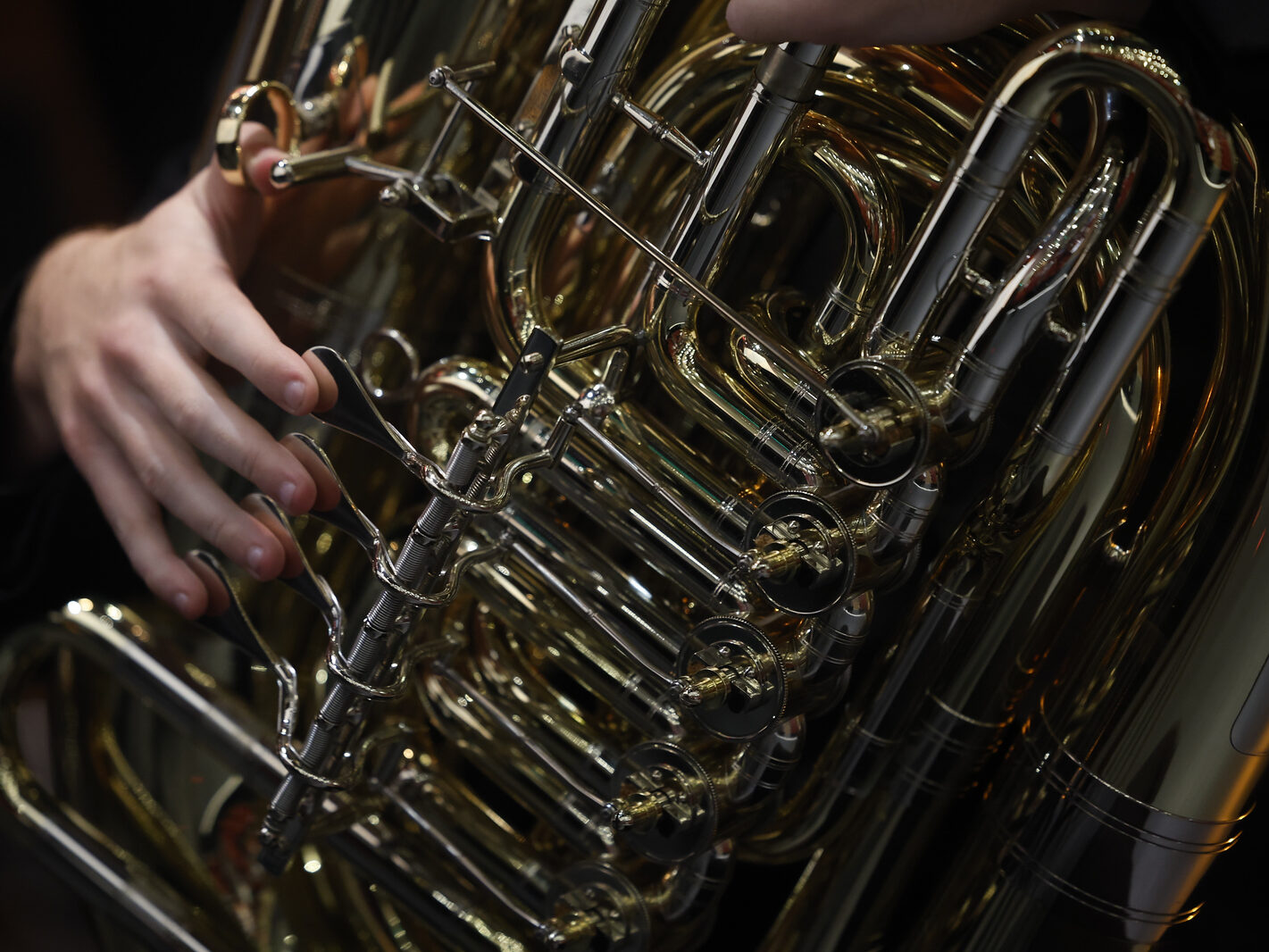
Program
Over the Moon
Frank Ticheli
(b. 1958)
Grand Concerto for 4 Tubas
I. “Intrada”
II. “Scherzo”
III. “Ballade”
IV. “Tango – Tarantella”
Arisa Makita, Derek Zimmerman, Logan Westerviller, Stephen Morman, soloists
John Stevens
(b. 1951)
Of Our New Day Begun
Omar Thomas
(b. 1984)
O Magnum Mysterium
Morten Lauridsen
(b. 1943)
Fantastic Dreams
I. “Dancing with the Muses”
II. “Elysian Fields”
III. “Magic Carpet”
IV. “L.A. Noir”
Frank Ticheli
(b. 1958)
Program Notes
Over the Moon
Frank Ticheli
Much as in the epic tales of Jules Verne’s From the Earth to the Moon and George Méliès’ iconic 1902 film A Trip to the Moon, I sought to take the listener on a brief musical voyage Over the Moon. At the start, the listener rides down a steep slide to the surface of the moon. At once a tango-like dance, glittery and light as silk, swims through the air. Instrumental solos appear and disappear like the characters of a story.
Suddenly the dance takes on a forbidding quality – plunger-muted growls appear as the work propels itself forward. Perhaps this is the dark side of the moon. Lines intermingle, the work lifts itself: Over the Moon, in joyful exuberance.
At the halfway mark, there is a brief respite, as if looking forward toward the peaceful blue planet: a hymn to life, to the Earth, the Moon, and towards the boundless energy of the Universe. A lone clarinet connects us to the return of the dance, reaching ever higher and brighter. A triumphant climax is suddenly quashed by a steep slide, back down to life on Earth
–Frank Ticheli
Grand Concerto for 4 Tubas
John Stevens
Grand Concerto for 4 Tubas was begun in the spring of 2009 and completed in August, 2010. It was commissioned by the Duisburg Philharmonic Orchestra, the Dresden Philharmonic, and the Bamberg Symphony Orchestra, especially for the Melton Tuba Quartett. This work is thought to be the first substantial, original work for tuba quartet and symphony orchestra.
As a professional tubist and teacher of tuba and euphonium, I have dedicated much of my life as a composer to writing for these low brass instruments in the solo and ensemble setting. The opportunity to create this work has provided me with a kind of culmination of my low brass composing. I was especially thrilled to be asked to compose this piece because of the high regard in which I hold the quartet and its members.
They wanted a work of substantial length, and we agreed on a format of four movements, rather than the more traditional three, in order to build more variety into the piece. The opening Intrada, like that of many a symphony, is the longest and most substantial movement of the piece. It introduces the heroic, powerful and energetic sounds of both the quartet as a group and its individual members. Throughout the entire work, I focused on “the quartet sound,” wanting to feature the group as an entity more than the individual members as “soloists.” However, I did want the audience to musically “meet” the individuals from time to time in the piece as well as provide contrasts in color, dynamic and energy by breaking the quartet down into smaller pieces from time to time.
The Scherzo is meant to showcase primarily the lighter aspects of the large low brass instruments in the hands of outstanding performers. These instruments have a much wider range of pitches, dynamics, and musical capabilities than most people realize. The stereotype, of course, is that they are always heavy and ponderous, but this is by no means the case. We tubists love nothing more than to open people’s ears to the other side of what these instruments can do.
As the slow movement of the work, the Ballade not surprisingly focuses on the sonorous, melodic, lyrical richness and vocal nature of the quartet. Showcasing the beautiful side of the tubas, used sparingly in orchestral repertoire where the emphasis is more on the power and strength of the brass, was the goal here.
Finally, the last movement is meant to dance, bring a fun and exciting finish to the work, give each player in the quartet one last chance to have their individual voice heard and leave the audience with a sense of awe at the sounds and energies that come from the pairing of a tuba quartet and orchestra.
My collaboration with the Melton Tuba Quartett on the project has also been fun and exciting. I thank them for the opportunity to work together to create this piece and I thank their respective orchestras for honoring the quartet and its members with a new work in an unexplored genre.
–John D. Stevens
Of Our New Day Begun
Omar Thomas
Of Our New Day Begun was written to honor nine beautiful souls who lost their lives to a callous act of hatred and domestic terrorism on the evening of June 17, 2015 while worshipping in their beloved sanctuary, the historic Emanuel African Methodist Episcopal Church (affectionately referred to as “Mother Emanuel”) in Charleston, South Carolina. My greatest challenge in creating this work was walking the line between reverence for the victims and their families, and honoring my strong, bitter feelings towards both the perpetrator and the segments of our society that continue to create people like him. I realized that the most powerful musical expression I could offer incorporated elements from both sides of that line – embracing my pain and anger while being moved by the displays of grace and forgiveness demonstrated by the victims’ families.
Historically, black Americans have, in great number, turned to the church to find refuge and grounding in the most trying of times. Thus, the musical themes and ideas for Of Our New Day Begun are rooted in the Black American church tradition. The piece is anchored by James and John Johnson’s time-honored song, “Lift Every Voice and Sing” (known endearingly as the “Negro National Anthem”), and peppered with blues harmonies and melodies. Singing, stomping, and clapping are also prominent features of this work, as they have always been a mainstay of black music traditions, and the inclusion of the tambourine in these sections is a direct nod to black worship services.
Of Our New Day Begun begins with a unison statement of a melodic cell from “Lift Every Voice…” before suddenly giving way to ghostly, bluesy chords in the horns and bassoons. This section moves to a dolorous and bitter dirge presentation of the anthem in irregularly shifting 12/8 and 6/8 meter, which grows in intensity as it offers fleeting glimmers of hope and relief answered by cries of blues-inspired licks. A maddening, ostinato-driven section representing a frustration and weariness that words cannot, grows into a group singing of “Lift Every Voice and Sing,” fueled by the stomping and clapping reminiscent of the black church.
In the latter half of the piece the music turns hopeful, settling into 9/8 time and modulating up a step during its ascent to a glorious statement of the final lines of “Lift Every Voice…” in 4/4, honoring the powerful display of humanity set forth by the families of the victims. There is a long and emotional decrescendo that lands on a pensive and cathartic gospel-inspired hymnsong. Returning to 9/8 time, the piece comes to rest on a unison F that grows from a very distant hum to a thunderous roar, driven forward by march-like stomping to represent the ceaseless marching of black Americans towards equality.
The consortium assembled to create this work is led by Dr. Gary Schallert and the Western Kentucky University Wind Ensemble.
–Omar Thomas
O Magnum Mysterium
Morten Lauridsen
Morten Lauridsen’s choral setting of “O Magnum Mysterium” (“O Great Mystery”) has become one of the world’s most performed and recorded compositions since its 1994 premiere by the Los Angeles Master Chorale conducted by Paul Salamunovich. About his setting, Morten Lauridsen writes, “For centuries, composers have been inspired by the beautiful “O Magnum Mysterium” text with its depiction of the birth of the new-born King amongst the lowly animals and shepherds. This affirmation of God’s grace to the meek and the adoration of the Blessed Virgin are celebrated in my setting through a quiet song of profound inner joy.” H. Robert Reynolds has arranged the symphonic wind version of this popular work with the approval and appreciation of the composer.
Fantastic Dreams
Frank Ticheli
Fantastic Dreams was composed during a six-week residency in the late summer and early fall of 2023 at the MacDowell Colony in Peterborough, New Hampshire. The work’s four short movements – really dreamscapes – are wide ranging in mood and style, yet connected via shared musical motives, gestures and themes.
Dancing with the Muses bursts forth ecstatically, settling into a series of short, light-hearted variations, each showcasing a different instrument or group – bassoon, oboe, horns, alto saxophones, trumpets. Short episodes and ghostly gestures interrupt the variations, like unrelated thoughts interrupting a dream.
Elysian Fields is a meditation directly influenced by my quiet morning walks at the MacDowell Colony amid peaceful forests and meadows. Unhurried lyrical lines float over a gentle walking motif that lilts back and forth like a lullaby.
Magic Carpet is a brisk two-minute scherzo that whirls and whisks in daring flight. At the midpoint, a respite – featuring solo oboe and flute with celesta – is but a moment to catch one’s breath before hurtling on again in magical flight.
The dream journey takes a dark turn:
L.A. Noir pays tribute to old Hollywood’s film noir tradition – a frantic chase scene, a dark figure lurking in the shadows, a moment of quiet, anxious anticipation. Midway through, the calm oboe melody from the scherzo’s middle section reappears, now in a more menacing atmosphere. The suspense builds relentlessly, the music culminating in a ferocious roar that suggests the melodramatic endings typical of many film noir pictures.
–Frank Ticheli
About the Artists
Carl St.Clair
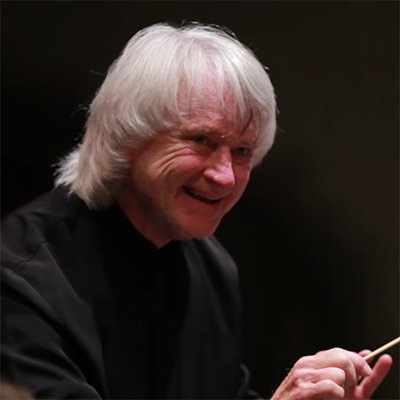 Carl St.Clair is internationally recognized for his distinguished career as a professional conductor and master teacher. He has had a continuing relationship with the USC Thornton School of Music for over 25 years as conductor of the USC Thornton orchestras and a faculty lecturer in conducting. In 2012, he took on an expanded role as artistic leader and principal conductor of the USC Thornton orchestras.
Carl St.Clair is internationally recognized for his distinguished career as a professional conductor and master teacher. He has had a continuing relationship with the USC Thornton School of Music for over 25 years as conductor of the USC Thornton orchestras and a faculty lecturer in conducting. In 2012, he took on an expanded role as artistic leader and principal conductor of the USC Thornton orchestras.
The 2022-2023 season marks his thirty-third year as music director of the Pacific Symphony. He is one of the longest-tenured conductors of the major American orchestras. St.Clair’s lengthy history solidifies the strong relationship he has forged with the musicians and the community. His continuing role also lends stability to the organization and continuity to his vision for the symphony’s future. Few orchestras can claim such rapid artistic development as the Pacific Symphony—the largest-budgeted orchestra formed in the United States in the last 50 years—due in large part to St.Clair’s leadership.
During his tenure, St.Clair has become widely recognized for his musically distinguished performances, his commitment to building outstanding educational programs and his innovative approaches to programming. In April 2018, St.Clair led the Pacific Symphony in its sold-out Carnegie Hall debut as the finale to the Carnegie’s yearlong celebration of pre-eminent composer Philip Glass’s eightieth birthday, ending in a standing ovation and with The New York Times calling the symphony “a major ensemble!” He led the Pacific Symphony on its first tour to China in May 2018, the orchestra’s first international tour since touring Europe in 2006. The orchestra made its national PBS debut in June 2018 on Great Performances with Peter Boyer’s “Ellis Island: The Dream of America,” conducted by St.Clair. Among St.Clair’s many creative endeavors are the highly acclaimed American Composers Festival, which began in 2000; and the opera initiative, “Symphonic Voices,” which continues for the ninth season in 2019-20 with Verdi’s Othello, following the concert-opera productions of Madame Butterfly, The Magic Flute, Aida, Turandot, Carmen, La Traviata, Tosca and La Bohème in previous seasons.
St.Clair’s commitment to the development and performance of new works by composers is evident in the wealth of commissions and recordings by the Pacific Symphony. The 2016-17 season featured commissions by pianist/composer Conrad Tao and composer-in-residence Narong Prangcharoen, a follow-up to the recent slate of recordings of works commissioned and performed by the symphony in recent years. These include William Bolcom’s Songs of Lorca and Prometheus (2015-16), Elliot Goldenthal’s Symphony in G-sharp Minor (2014-15), Richard Danielpour’s Toward a Season of Peace (2013-14), Philip Glass’ The Passion of Ramakrishna (2012-13) and Michael Daugherty’s Mount Rushmore and The Gospel According to Sister Aimee (2012-13). St.Clair has led the orchestra in other critically acclaimed albums including two piano concertos of Lukas Foss, Danielpour’s An American Requiem and Goldenthal’s Fire Water Paper: A Vietnam Oratorio with cellist Yo-Yo Ma. Other commissioned composers include James Newton Howard, Zhou Long, Tobias Picker, Frank Ticheli, Chen Yi, Curt Cacioppo, Stephen Scott, Jim Self (Pacific Symphony’s principal tubist) and Christopher Theofanidis.
In 2006 and 2007, Carl St.Clair led the orchestra’s historic move into its home in the Renée and Henry Segerstrom Concert Hall at Segerstrom Center for the Arts. The move came on the heels of the landmark 2005-2006 season that included St.Clair leading the symphony on its first European tour—nine cities in three countries playing before capacity houses and receiving extraordinary responses and reviews.
From 2008-2010, St.Clair was general music director for the Komische Oper in Berlin. He also served as general music director and chief conductor of the German National Theater and Staatskapelle (GNTS) in Weimar, Germany, where he led Wagner’s Ring Cycle to critical acclaim. He was the first non-European to hold his position at the GNTS; the role also gave him the distinction of simultaneously leading one of the newest orchestras in America and one of the oldest in Europe.
In 2014, Carl St.Clair became the music director of the National Symphony Orchestra in Costa Rica. His international career also has him conducting abroad several months a year, and he has appeared with orchestras throughout the world. He was the principal guest conductor of the Radio Sinfonieorchester Stuttgart from 1998 to 2004, where he completed a three-year recording project of the Villa–Lobos symphonies. He has also appeared with orchestras in Israel, Hong Kong, Japan, Australia, New Zealand, South America, China, Thailand and Malaysia and in summer festivals worldwide. In North America, St.Clair has led the Boston Symphony Orchestra (where he served as assistant conductor for several years), New York Philharmonic, Philadelphia Orchestra, Los Angeles Philharmonic and the San Francisco, Seattle, Detroit, Atlanta, Houston, Indianapolis, Montreal, Toronto and Vancouver symphonies, among many.
Carl St.Clair is a strong advocate of music education for all ages and is internationally recognized for his distinguished career as a master teacher. He has been essential to the creation and implementation of the Pacific Symphony’s education and community engagement programs including Pacific Symphony Youth Ensembles, Heartstrings, Sunday Matinées, OC Can You Play With Us?, arts-X-press and Class Act. In addition to his professional conducting career, St.Clair has worked with most major music schools across the country. In 2018, Chapman University President Danielle Struppa appointed St.Clair as a Presidential Fellow, working closely with the students of the College of the Performing Arts at Chapman University. St.Clair has been named “Distinguished Alumni in Residence” at the University of Texas Butler School of Music beginning 2019. And, for over 25 years, he has had a continuing relationship with the USC Thornton School of Music where he is artistic leader and principal conductor of the orchestral program.
Frank Ticheli
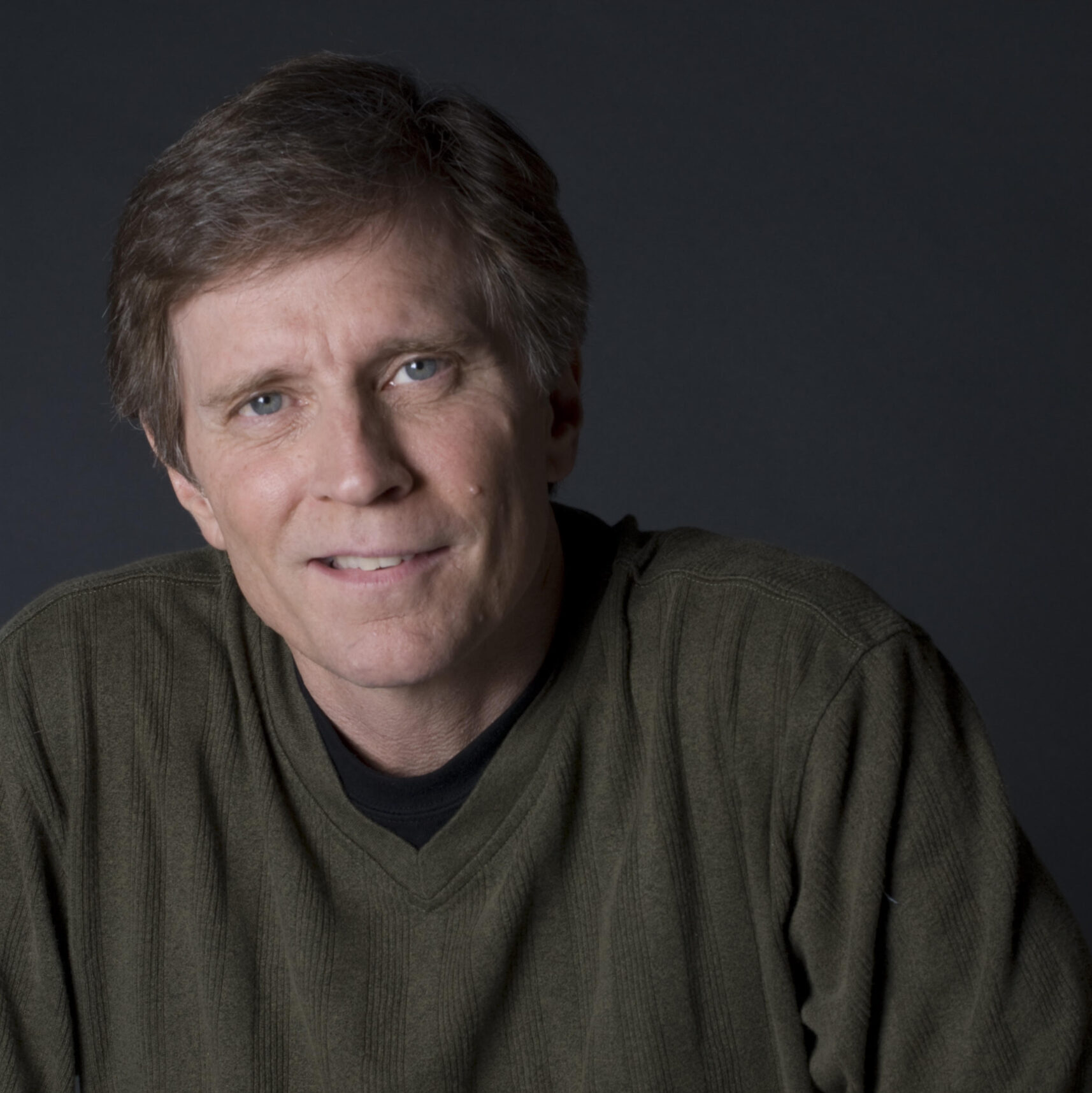 Frank Ticheli’s music has been described as being “optimistic and thoughtful” (Los Angeles Times), “lean and muscular” (New York Times), “brilliantly effective” (Miami Herald) and “powerful, deeply felt crafted with impressive flair and an ear for striking instrumental colors” (South Florida Sun-Sentinel). Ticheli is Professor Emeritus at the University of Southern California’s Thornton School of Music, where he taught for 32 years (1991-2023). From 1991 to 1998, Ticheli was Composer in Residence of the Pacific Symphony and composed numerous works for that orchestra.
Frank Ticheli’s music has been described as being “optimistic and thoughtful” (Los Angeles Times), “lean and muscular” (New York Times), “brilliantly effective” (Miami Herald) and “powerful, deeply felt crafted with impressive flair and an ear for striking instrumental colors” (South Florida Sun-Sentinel). Ticheli is Professor Emeritus at the University of Southern California’s Thornton School of Music, where he taught for 32 years (1991-2023). From 1991 to 1998, Ticheli was Composer in Residence of the Pacific Symphony and composed numerous works for that orchestra.
Frank Ticheli’s orchestral works have received considerable recognition in the U.S. and Europe. Orchestral performances have come from the Philadelphia Orchestra, Atlanta Symphony, Detroit Symphony, Dallas Symphony, American Composers Orchestra, the radio orchestras of Stuttgart, Frankfurt, Saarbruecken, and Austria, and the orchestras of Austin, Bridgeport, Charlotte, Colorado, Haddonfield, Harrisburg, Hong Kong, Jacksonville, Lansing, Long Island, Louisville, Lubbock, Memphis, Nashville, Omaha, Phoenix, Portland, Richmond, San Antonio, San Jose, Wichita Falls, and others.
Ticheli is well known for his works for concert band, many of which have become standards in the repertoire. In addition to composing, he has appeared as guest conductor of his music at Carnegie Hall, at many American universities and music festivals, and in cities throughout the world, including Schladming (Austria), Beijing and Shanghai, London and Manchester, Singapore, Rome, Sydney, and numerous cities in Korea and Japan.
Frank Ticheli is the recipient of a 2012 “Arts and Letters Award” from the American Academy of Arts and Letters, his third award from that prestigious organization. He is a two-time winner of the William D. Revelli Memorial Band Composition and a recipient of the 2023 Academy of Wind and Percussive Arts Award from the National Band Association. Other awards include the Walter Beeler Memorial Prize and First Prize awards in the Texas Sesquicentennial Orchestral Composition Competition, Britten-on-the-Bay Choral Composition Contest, and Virginia CBDNA Symposium for New Band Music.
In 2018, Ticheli received the University of Michigan Alumni Society’s highest honor, the Hall of Fame Award, in recognition for his career as a composer. He was also awarded national honorary membership to Phi Mu Alpha Sinfonia, “bestowed to individuals who have significantly contributed to the cause of music in America,” and the A. Austin Harding Award by the American School Band Directors Association, “given to individuals who have made exceptional contributions to the school band movement in America.” At USC, he has received the Dean’s Award for Professional Achievement, and the Virginia Ramo Award “in recognition of outstanding contribution to music and education, to the USC Thornton School of Music and University of Southern California, and to Humanity.”
Frank Ticheli’s works are published by Manhattan Beach, Southern, Hinshaw, and Encore Music, and are recorded on the labels of Albany, Chandos, Clarion, Equilibrium, Klavier, Koch International, Mark, Naxos, Reference, and Decca Classics. For more information, please visit the composer’s website: www.FrankTicheli.com.
Arisa Makita
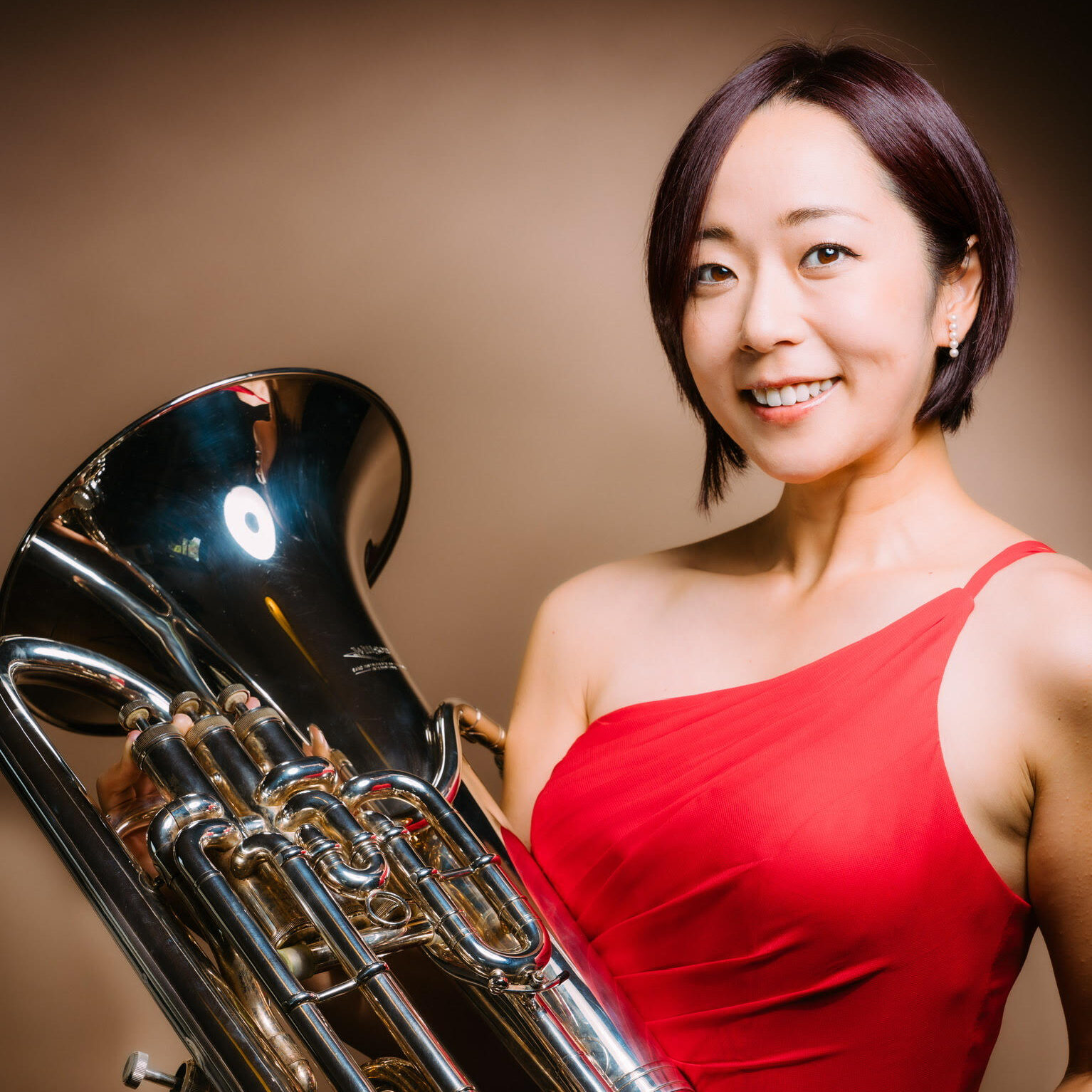 Arisa Makita is a euphonium soloist who moved to Los Angeles from Tokyo in 2022. She is currently pursuing the Artist Diploma program at the USC Thornton School of Music, studying with Doug Tornquist. Arisa has achieved notable success, including winning 1st prize at the 2019 International Euphonium Tuba Conference Competition, Electronic Euphonium Division, and 2nd prize at the 2023 International Tuba Euphonium Conference Competition in the Euphonium Solo Artist Division.
Arisa Makita is a euphonium soloist who moved to Los Angeles from Tokyo in 2022. She is currently pursuing the Artist Diploma program at the USC Thornton School of Music, studying with Doug Tornquist. Arisa has achieved notable success, including winning 1st prize at the 2019 International Euphonium Tuba Conference Competition, Electronic Euphonium Division, and 2nd prize at the 2023 International Tuba Euphonium Conference Competition in the Euphonium Solo Artist Division.
Her recent accomplishments include winning the USC Thornton Concerto Competition and performing as a soloist with the Thornton Winds in October 2023. Additionally, she was invited as a guest artist to give a solo recital at the University of Redlands. In 2024, Arisa received the USC Thornton Outstanding Graduate Award.
She was invited to perform a recital this summer at the International Women’s Brass Conference in Mito, Ibaraki, where she premiered the Sonata for Euphonium and Piano, composed by David Conte, the Chair of Composition at the San Francisco Conservatory of Music.
Derek Zimmerman
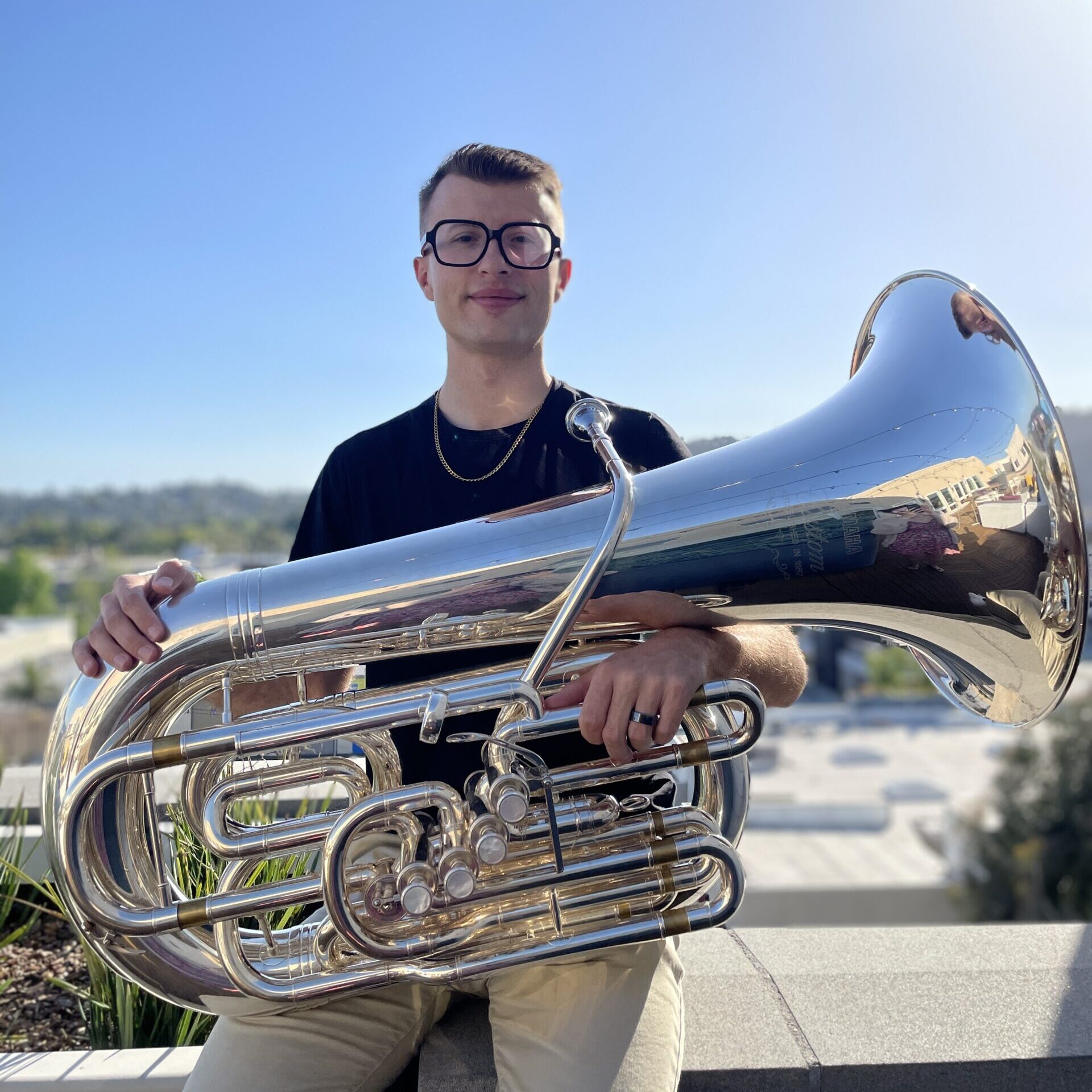 Derek Zimmerman is a musician based in Los Angeles, California, and passionate about performing, educating, and creating music.
Derek Zimmerman is a musician based in Los Angeles, California, and passionate about performing, educating, and creating music.
Derek is the leader of Cali Brass where he performs with and arranges for a variety of chamber and pop ensembles.
Derek has performed with the Disneyland Band, California Young Artist Symphony, Brittany Howard, Blow Brass Band, Los Angeles Marching Band, Hammerstein Musik Bavaria, The Dawn, Funk Sauce Brass Band, Chicago Metropolitan Symphony Orchestra, Heartland Festival Orchestra, Chicago Brass Band, and Peoria Municipal Band.
Derek has appeared in Season 2 of NBC’s Night Court and an episode of Hell’s Kitchen.
Derek is nearing the completion of a Doctoral of Musical arts degree at the University of Southern California studying with Doug Tornquist and Jim Self. Derek previously studied with Dr. Andrew Rummel at Illinois State University.
Logan Westerviller
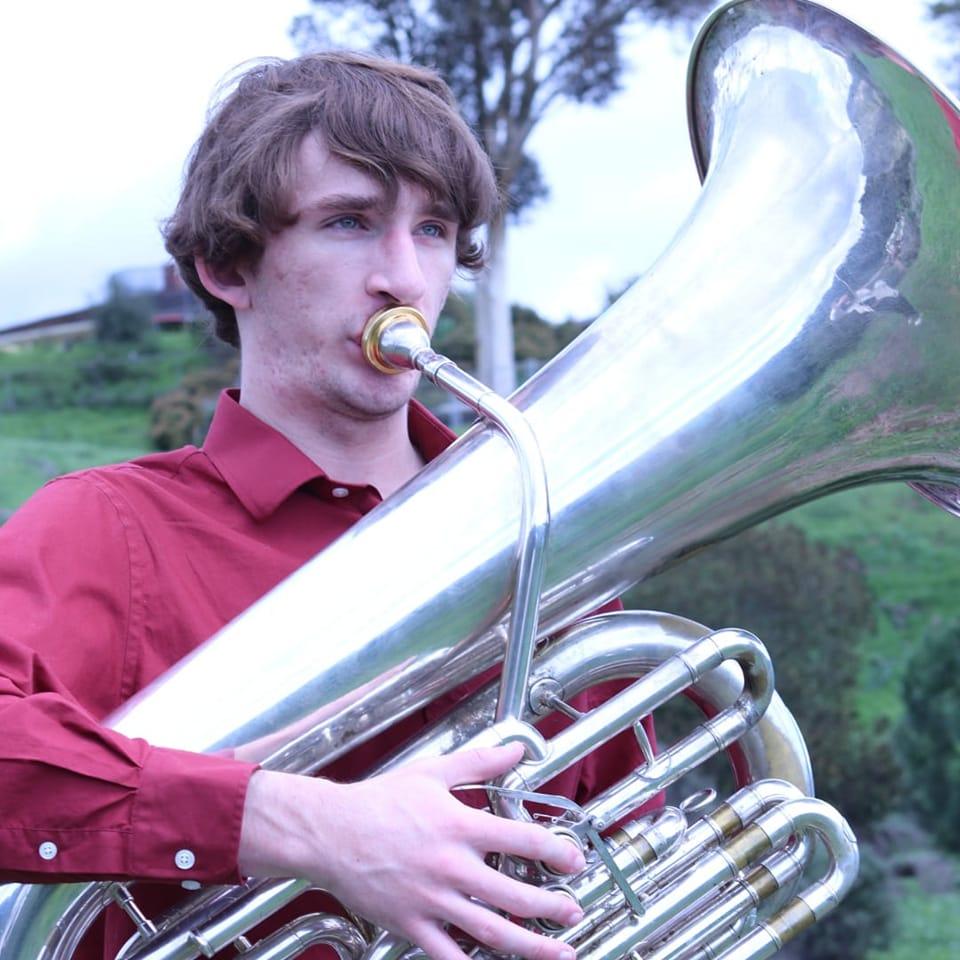 Logan Westerviller is a tubist and composer currently residing in Los Angeles. Logan holds degrees in instrumental performance and composition from Capital University, and, while in Los Angeles, is currently enrolled at the University of Southern California for his master’s degree in tuba performance. He has also participated in the Los Angeles Film Conducting Intensive, serving as the tubist in the student orchestra, and has recently performed with the Pacific Symphony Orchestra.
Logan Westerviller is a tubist and composer currently residing in Los Angeles. Logan holds degrees in instrumental performance and composition from Capital University, and, while in Los Angeles, is currently enrolled at the University of Southern California for his master’s degree in tuba performance. He has also participated in the Los Angeles Film Conducting Intensive, serving as the tubist in the student orchestra, and has recently performed with the Pacific Symphony Orchestra.
Logan frequently competes on the tuba, and has placed in several competitions, including honorable mention in the New Albany Symphony Orchestra Concerto Competition, 3rd prize in the Online International Music Competition hosted in Paris, and is a winner of the King’s Peak International Music Competition.
As an active composer, Logan frequently gets his compositions performed. Logan has had a variety of works performed, which includes performances by Vaughn Wiester’s Famous Jazz Orchestra, the Hilliard Community Band, and several chamber groups in Columbus, Ohio.
Stephen Morman
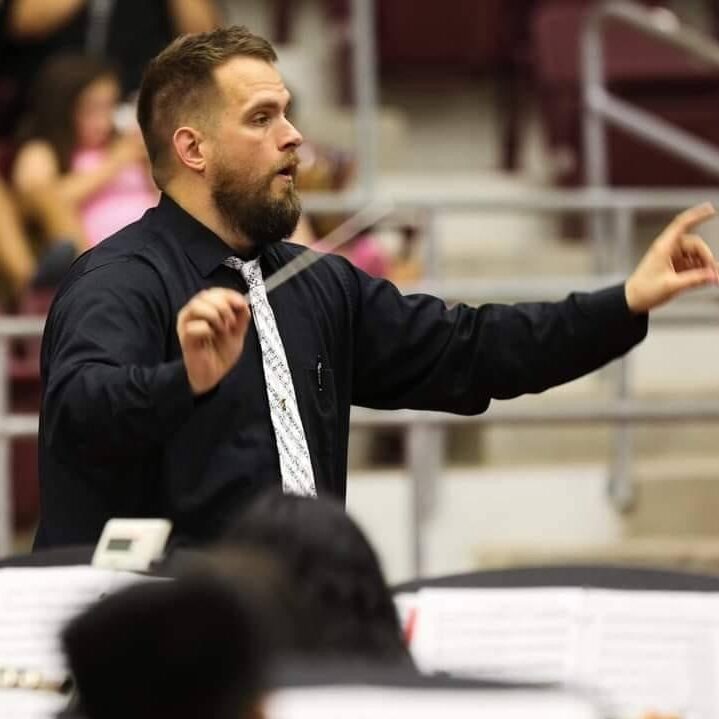 Stephen Morman is a second-year DMA student in the Music Teaching and Learning department at the University of Southern California’s Thornton School of Music, specializing in Music Teaching and Learning, Theory and Analysis, Instrumental Conducting, and Band Arranging.
Stephen Morman is a second-year DMA student in the Music Teaching and Learning department at the University of Southern California’s Thornton School of Music, specializing in Music Teaching and Learning, Theory and Analysis, Instrumental Conducting, and Band Arranging.
Mr. Morman spent nine years teaching public school bands in Athens, Texas from 2014 to 2023. He received a Bachelor’s and Master’s Degree in Music Education and Wind Band Conducting from Stephen F. Austin State University in Nacogdoches, Texas, respectively, and has additional experience in leading collegiate wind and athletic bands during his time as a Graduate Teaching Assistant at SFA.
Ensemble
FLUTE
Aarushi Kumar
Ellen Cheng
Kiana Kawahara
Luke Blancas
Sylvia Ettinger
OBOE
Ricky Arellano
Sara Petty
CLARINET
Alexander Varvne
Anders Peterson
Andrei Bancos
Ashrey Shah
Bram Schenck
Harrison Chiang
Jane Pankhurst
Joshua Tang
Louis Milne
BASSOON
Henry Mock
Jerver Hernandez
SAXOPHONE
Collin Juniper
Ezequiel Castaneda
Gaoyuan Chen
Issac Ko
Joshua Hebert
Julianna Townley
Reese Whitley
Sophia Flores
HORN
Grace Kim
Jean Smith
Joe Oberholzer
Kira Goya
Lauren Goff
Reese Romero
Steven Phan
TRUMPET
Ayaka Miura
EJ Miranda
Jazzmine Van Veld
Jorge Araujo Felix
Lauren Spring
Shreeka Kumar
TROMBONE
Alicia Miller
Avery Robinson
Emmanuel Rojas
Harrison Chiang
Pablo Castro
Sean Cooney
Terry Cowley
EUPHONIUM
Neha Kudva
TUBA
Alexander Tran
Stephanie Magera
STRING BASS
Jared Prokop
PIANO
Chloe Gwak
TIMPANI
Marcos Rivera
PERCUSSION
Brandon Lim
Chanhui Lim
Marcos Salgado
Preston Spisak
Sabrina Lai
Tyler Brown
Xavier Zwick